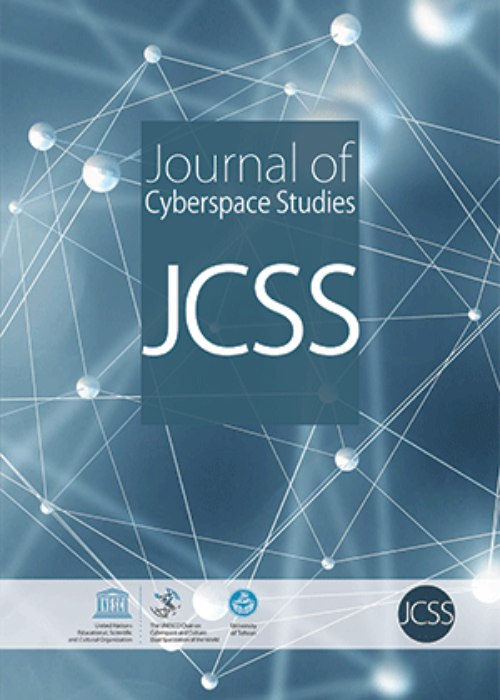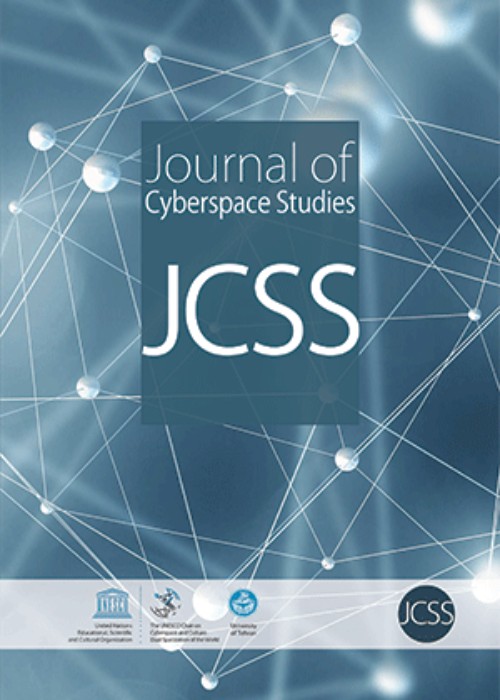فهرست مطالب

Journal of Cyberspace Studies
Volume:6 Issue: 2, Summer-Autumn 2022
- تاریخ انتشار: 1401/12/23
- تعداد عناوین: 5
-
Pages 107-130This study investigates problematic smartphone attachment under conditions of short-term smartphone separation. Two experimental studies with randomized group allocation were designed to investigate effects of smartphone separation on anxiety and inhibitory control. Problematic smartphone use pathways were explored using a self-report measure. In the first experiment (N= 85) smartphone addicted participants showed an increase in state anxiety after 20 min of separation from their smartphones compared to a control group of non-addicted participants. There was no evidence for impaired inhibitory control based on a period of smartphone separation. In the second experiment the methodology was slightly varied, and the participants (N= 95) were provided with a task during a smartphone separation of 15 min. This led to a reduction of state anxiety for problematic attached participants but did not result in a change for unproblematic attached participants. Problematic attached participants showed a larger disturbance in inhibitory control undergoing a separation period than unproblematic attached participants. Moreover, the results provide supplementary evidence for the existence of specific problematic smartphone attachment pathways and further variables.Keywords: anxiety, inhibitory control, problematic mobile phone use, Smartphone addiction, smartphone separation
-
Pages 131-148This research explores gender differences in motivations and gratifications related to playing video games such as The Sims. We analyzed both men’ and women’ differences in game related motivations and gratifications to identify which factors make a game more gratifying for a specific gender of players. We conducted in-depth interviews with 18 male players and 20 female players of The Sims. We also analyzed online forums of The Sims. We found that main gratifying factors related to game-playing experience include appearance, character, storyline, control and complexity, fantasy and social interaction. The findings propose that game researchers with the uses and gratifications theoretical framework should consider the importance of including game features as gratifying factors in their questionnaires. Finally, we have provided implications for future research about gender differences in motivations and gratifications based on uses and gratifications theory.Keywords: gender differences, gratifications, motivations, Video games
-
Pages 149-182Cyberbullying is a form of bullying meted out online using digital devices and platforms. This study investigated the types of cyberbullying undergraduate students in Kenyan universities experience. Specifically, it sought to determine the students’ presence on Facebook, establish how the students used Facebook, identify the types of cyberbullying they experienced, and recommend strategies of mitigating cyberbullying as a means of making Facebook safer for undergraduate students in Kenya. The study was conducted using mixed research methods. Data was collected from 4770 undergraduate students and 24 deans of students in 16 public and 8 private chartered universities in Kenya. Quantitative data was collected from the students’ using questionnaires while qualitative data was collected from students using focus group discussions and deans of students using key informant interviews. Quantitative data was analysed statistically using STATA while qualitative data was analysed thematically using ATLAS.ti. The findings of the study confirm the popularity of Facebook among undergraduate students in Kenya. Students use the platform mainly for dating, business, academics and politics. The main types of cyberbullying experienced by the students on Facebook include shaming, impersonation, blackmail, exposure and cyberstalking. In dealing with cyberbullying, university authorities should create awareness about the vice among their students; the affected students should be counselled to overcome the effects of cyberbullying; and students should be advised to be vigilant in cyberspace. The findings of this study may be applied by universities to develop a students’ support service model that makes it easy to detect and mitigate cyberbullying.Keywords: blackmail, cyberstalking, exposure, impersonation, shaming
-
Pages 183-204Globally, Internet censorship is on the rise and Iran has been portrayed as one of the most critical cases. So far, however, no studies have investigated the issue from an inside look. To fill this literature gap, the present paper aims to provide an overview of Internet censorship in Iran, by assessing the Iranian perspective on Internet freedom, different aspects of the subject, as well as the domestic and foreign types of limitations clients face today. This study has shown that Iran’s current filtering policy is a lenient one pursuing Internet development and simultaneously providing protection against potential threats. The Iranian case also includes some global issues such as censorship imposed due to the U.S. sanctions. Specifically, the findings of this study revealed that the range and extent of restrictions imposed on the Iranians’ access to mobile applications by the U.S. are significantly more than those placed by the Iranian filtering regime.Keywords: censorship, Internet filtering. Islamic Republic of Iran, United States of America
-
Pages 205-218
After a brief description of what fake news is and how it has been developed historically, we have claimed that fake news as we know it is generally a social media phenomenon. Despite the fact that Iran is considered a developing country, and not still a developed one, one might think Iran is less likely to fall prey of complicated fake news industry that negatively affect prosperous and affluent countries. But the vice versa is correct. Doing an extensive survey on previous research on fake news in Iran, we have shown how fake news will hinder unprecedented facilities for freedom of expression and even will make people contemplate giving up their freedom of expression in order to avoid or get rid of fake news. A naïve view could see a bright future for unbiased and disinterested news gathering and publishing, but research has shown in a totally unregulated media sphere, it is fake news that is more radially available and more quickly becoming viral.
Keywords: COVID-19, fake news, freedom of expression, Iran, virality of news


